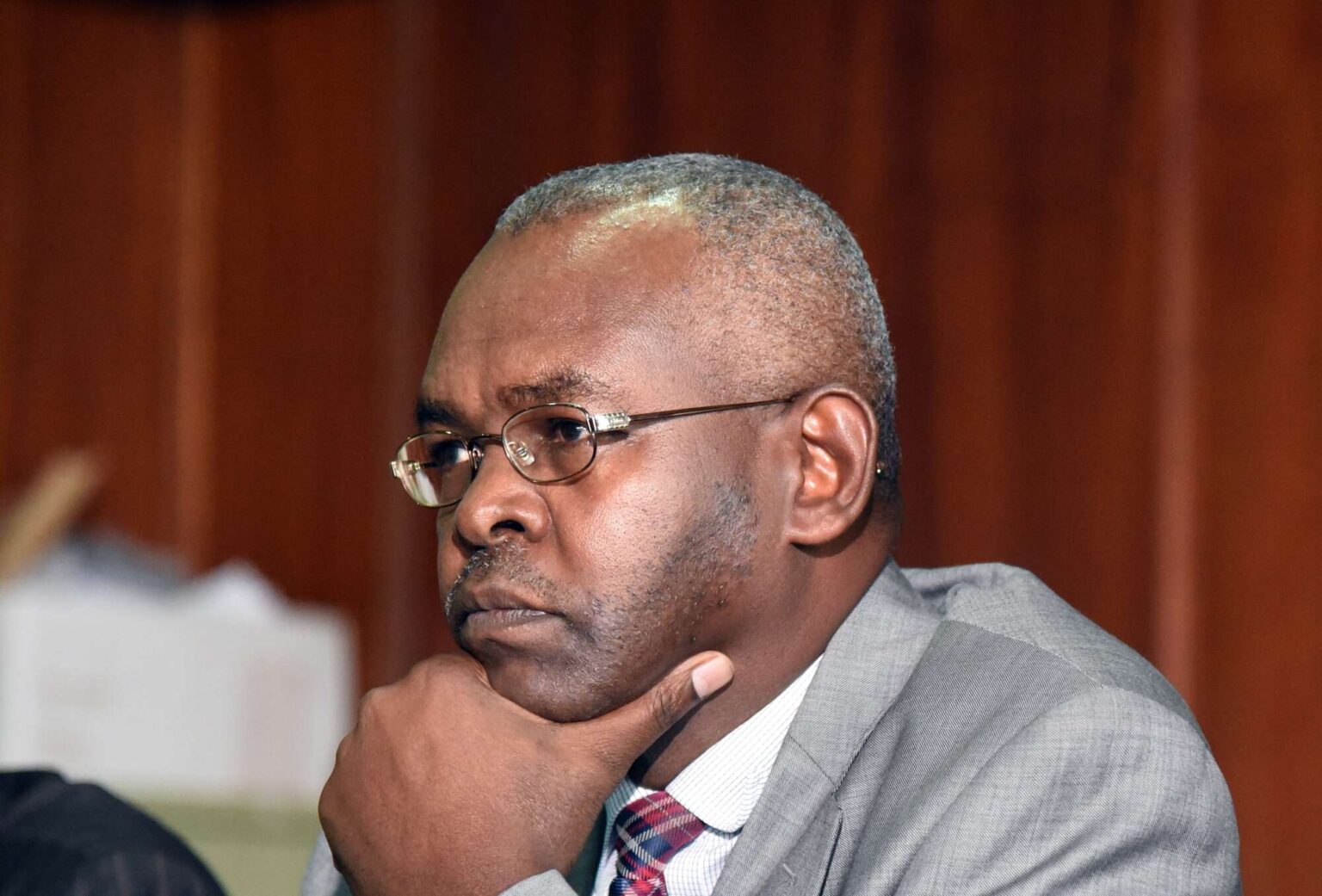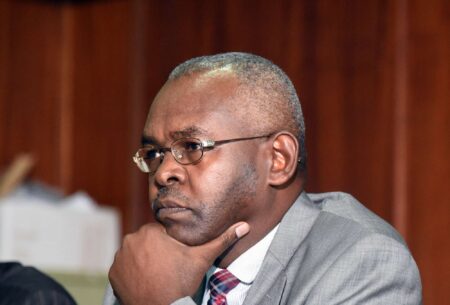- Many people view Dr. Kamau Thugge as a conservative choice for the CBK governor.
- Thugge’s nomination as CBK governor comes at a crucial time for the Kenyan economy.
- As Dr. Kamau Thugge prepares to take office as CBK governor, it seems likely that many of his priorities lie in fixing problems.
On 15 May, President William Ruto nominated Dr. Kamau Thugge as the new governor of the Central Bank of Kenya (CBK). If the Senate and the National Assembly ratify the appointment, Thugge will begin his first term as the CBK governor in mid-June. Kamau Thugge will replace the incumbent Patrick Njoroge who assumed office as CBK governor in 2015.
Thugge’s nomination as CBK governor comes at a crucial time for the Kenyan economy. Kenya’s inflation remains high at almost 8 per cent. The Kenyan shilling has also hit all-time lows against the US dollar. Thus, the monetary policies from the CBK will most likely come in handy in the coming months. But what makes Thugge the perfect fit for the crucial role of Kenya’s top banker?
A look at Dr. Kamau Thugge’s experience
Many people view Dr. Kamau Thugge as a conservative choice for the CBK governor. Schooled in the United States, Thugge has had a long-running international and national economic career. This career dates back to the near-twenty-year spell as an IMF economist from 1985 to 2004. Thugge returned to the IMF for another two years between 2008 and 2010 as a deputy division chief. Kamau Thugge’s career has also spanned working for the Kenyan government. His latest position is President Ruto’s Council of economic advisors.
There appears to be great optimism in Kenya that Dr. Kamau Thugge could prove a wise choice for CBK governor. According to Edwin Dande, CEO of Cytonn Investments, Thugge has unique qualifications from his Treasury and IMF experience, not to mention his Ivy League credentials. Dande hopes Thugge will uphold strong ethical standards, the main challenge for a CBK governor.
READ MORE: Central Bank of Kenya firm on Cryptocurrencies ban
Optimism in Dr. Kamau Thugge’s appointment as CBK governor
Kenya’s financial markets seemed to react positively to the news of Thugge’s appointment. The Nairobi Securities Exchange Index jumped over 7 per cent in the aftermath of President Ruto’s announcement. This probably reflects the optimism that Thugge’s experience in international finance could help Kenya chart a clear path out of the economic depression. Thugge’s history at the IMF could prove particularly valuable, with Kenya reportedly discussing fresh funding with the financial organization. Kenya seeks assistance to support its dwindling foreign exchange reserves, which have fallen to $6.6bn, the lowest since 2015.
The reserves equal just 3.66 months of imports, despite the law requiring the CBK to maintain four months’ worth of cover. Fitch Ratings has warned that “increased balance of payment pressures and a sustained reduction in international reserves could lead to further negative rating action.” Dr. Kamau Thugge must leverage his experiences at the IMF to secure the funding Kenya desperately requires.
Dorcas Muthoni Mutonyi, an entrepreneur based in Nairobi who was on the shortlist of candidates for the CBK governor position, observes that Thugge’s economic principles align with the President’s. “Dr. Thugge has worked closely with President Ruto as senior advisor and head of fiscal affairs and budget policy,” she says. “This is a strong indicator that not only is he well aligned with the president’s priorities, but that he has likely played a significant role in defining the president’s economic and fiscal priorities.”
Backing the government’s high spend policies
Thugge’s ideological alignment with President William Ruto may indicate that the CBK would seek to support the government’s high-spend policies, such as the Hustler Fund, offering appropriate credit to low-income citizens. Quantitative easing (QE) represents one way to achieve this support. QE is designed to inject more funds into the money supply and lower long-term borrowing costs to support spending.
Such a strategy would, though, risk increasing the inflation rate at a time when it is already high. Mutonyi suggests that, rather than embracing QE, Thugge will likely look to the bond markets to find the money needed to fund the government’s policies.
She observes that Thugge’s understanding of the international bond market will prove useful because it will give him the skills and knowledge necessary to raise funds from international investors. This will be important as the Kenyan government seeks to finance its development agenda.
Navigating bond markets will be challenging. However, Dr. Kamau Thugge could help strengthen Kenya’s credibility on international markets, but firm action to improve Kenya’s credit rating will be needed before the country can start to borrow at attractive rates again.
Stabilizing the shilling
Stabilizing the Kenyan shilling presents another significant task for Dr. Kamau Thugge as he attempts to reduce inflation in Kenya. Fuel and food prices have remained on the rise, both prompted by market instability in the global oil markets. The weakening shilling has further contributed to prices rising in the local context.
Kenya currently runs a substantial trade deficit of just under $800m monthly. The country relies on imports for many essential goods, most of which are priced in US dollars, the international trade currency. Thugge could attempt to strengthen the currency by hiking interest rates to incentivize more foreign investors to hold the shilling. However, it is also true that the CBK will partly remain at the mercy of global economic factors, not least the decisions of the Federal Reserve in Washington, DC.
Indeed, the shilling’s recent weakness comes from domestic instability and a US dollar that has strengthened on the back of the Fed’s move to hike interest rates and a global flight to “safe” assets amid economic volatility.
This exposes the limits of the powers of the CBK governor. Mutonyi points out that Dr. Kamau Thugge’s international experience equips him with strong knowledge of the global context. Thus “if he can navigate the challenges of the role successfully, he has the potential to make a positive contribution to the Kenyan economy.”
Dr. Kamau Thugge’s main challenges as CBK governor
Inflation
As Dr. Kamau Thugge prepares to take office, it seems likely that many of his priorities lie in fixing problems. Inflation remains one of the key problems that Thugge will need to address as CBK governor. From the Economic Survey 2023, the consumer price index (CPI) indicates that inflation rose from 6.1 in 2021 to 7.7 per cent in 2022. The rising food, fuel, and other commodity prices have worsened inflationary pressures. Therefore, Dr. Kamau Thugge must implement policies to anchor inflation without stifling Kenya’s economic growth.
Strengthening reserve
Strengthening the CBK reserves poses a significant challenge for Dr. Thugge as the next CBK governor. The bulk of CBK reserves is denominated in US dollars. The reserves also serve as backup funds in an unlikely emergency, such as a devaluation of the shilling. According to our CBK Act, Kenya’s top banker should use the best endeavors to maintain a reserve of external assets at an aggregate amount of not less than four months of import cover calculated in a particular way.
Credit rating
Kamau Thugge also needs to improve Kenya’s rock-bottom credit rating. Moody’s Investors Service downgraded Kenya’s credit rating deeper into junk territory owing to an upsurge in government liquidity risks. The credit rating appraiser downgraded Kenya by a notch to B3. This represents six levels below investment grade, according to a mid-May statement. That downgrade puts Kenya on par with Angola and Mongolia. Moreover, Moody’s also place the nation under review for a further cut.
As Kamau Thugge comes in as the CBK governor, he needs to get prices under control to tame inflation. He also needs to defend the Kenyan shilling from further declines and give the currency space to make gains. But, as Mutonyi argues, the next CBK governor must do all this while introducing more proactive measures to stimulate long-term economic growth in Kenya. The initial signs are positive for most. However, Dr. Kamau Thugge has a lot to do if he is to succeed in dragging Kenya out of its current economic predicament.

